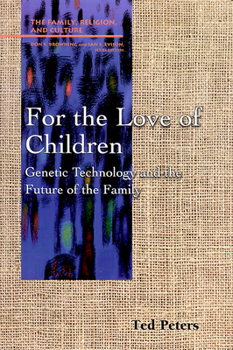For the Love of Children: Genetic Technology and the Future of the Family
Select Format
Select Condition 
Book Overview
Choices in reproductive technology have multiplied at a staggering rate. Is our society prepared to decide on issues about procreation (artificial insemination and invitro fertilization) or genetic engineering ("designer children" and selective abortion)? How can we protect children--both born and unborn--who are conceived in these ways from being regarded as merchandise in the expanding marketplace of genetic services? Ted Peters sets out the...
Format:Paperback
Language:English
ISBN:0664254683
ISBN13:9780664254681
Release Date:October 1996
Publisher:Westminster John Knox Press
Length:240 Pages
Weight:0.70 lbs.
Dimensions:0.8" x 6.0" x 8.9"
Customer Reviews
1 rating
Children are not commodities
Published by Thriftbooks.com User , 25 years ago
Reports on technical developments and ethical issues in the fields of genetics and reproduction are the subject of frequent news broadcasts and cultural commentary. In this book, systematic theologian Ted Peters addresses one of the most disturbing challenges facing both society and churches, namely, how to deal with the emerging possibilities for the control and management of human reproduction offered by the scientific advancements of modern biology and medicine. The end result is a proposal for a theology and ethics in genetics and reproduction that focuses on what is good for children. Like so many Protestant theologians, Peters is led to consider Roman Catholic moral thought in these areas of medical ethics. His background as a systematic theologian allows him to make positive use of both Protestant and Catholic resources in constructing his argument. The gist of that argument is that new reproductive technologies risk making children into commodities--mere products of their parents' choices and financial wherewithal to realize them. The separation of the goals of parents from the good of their prospective children and the application of the measure of what is good for children in these crucial reproductive decisions are the foundation of Peters' proposal for ensuring that such procedures are taken for the love of children. The subject of commodification and the new reproductives is as timely as it is compelling. One memorable news story not long ago focused on the decision of one couple to advertise for egg donors in the student newspaper at Yale University with the specification that the donor be 5'10" or more in height and have an SAT score of at least 1400. Amid the various doctors and ethicists commenting on the case was a Yale student editor who keenly appreciated the risk of commodification and the potentially devastating consequences for children bred to fulfill the dreams and desires of their parents. The issue of commodification also looms large in stories of the extravagant emotional and financial lengths that some would-be parents are willing to go in resorting to the new reproductive technologies to address the problem of infertility. What Peters offers us with this book is a constructive theological approach to these issues that is both realistic and hopeful.





